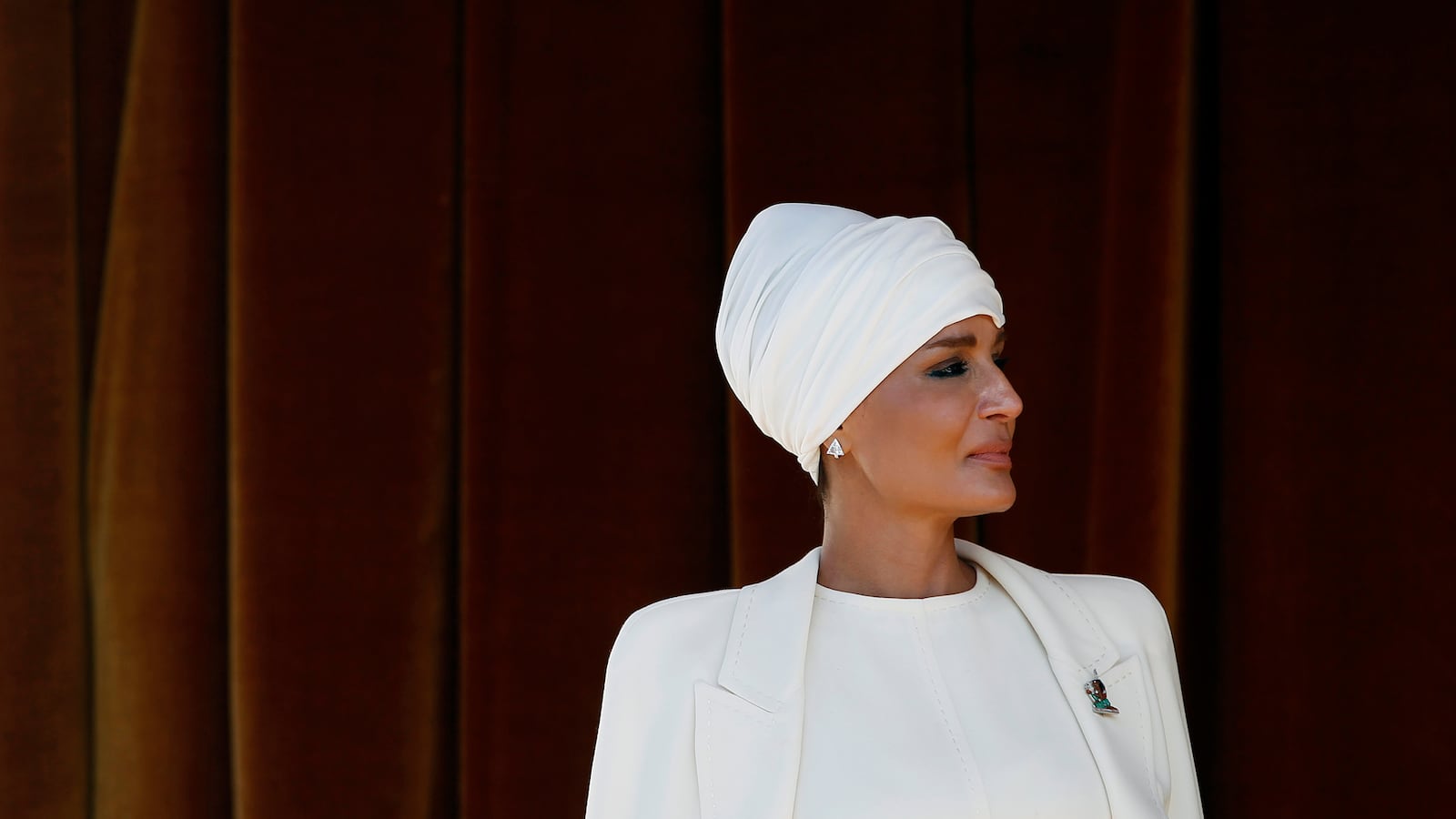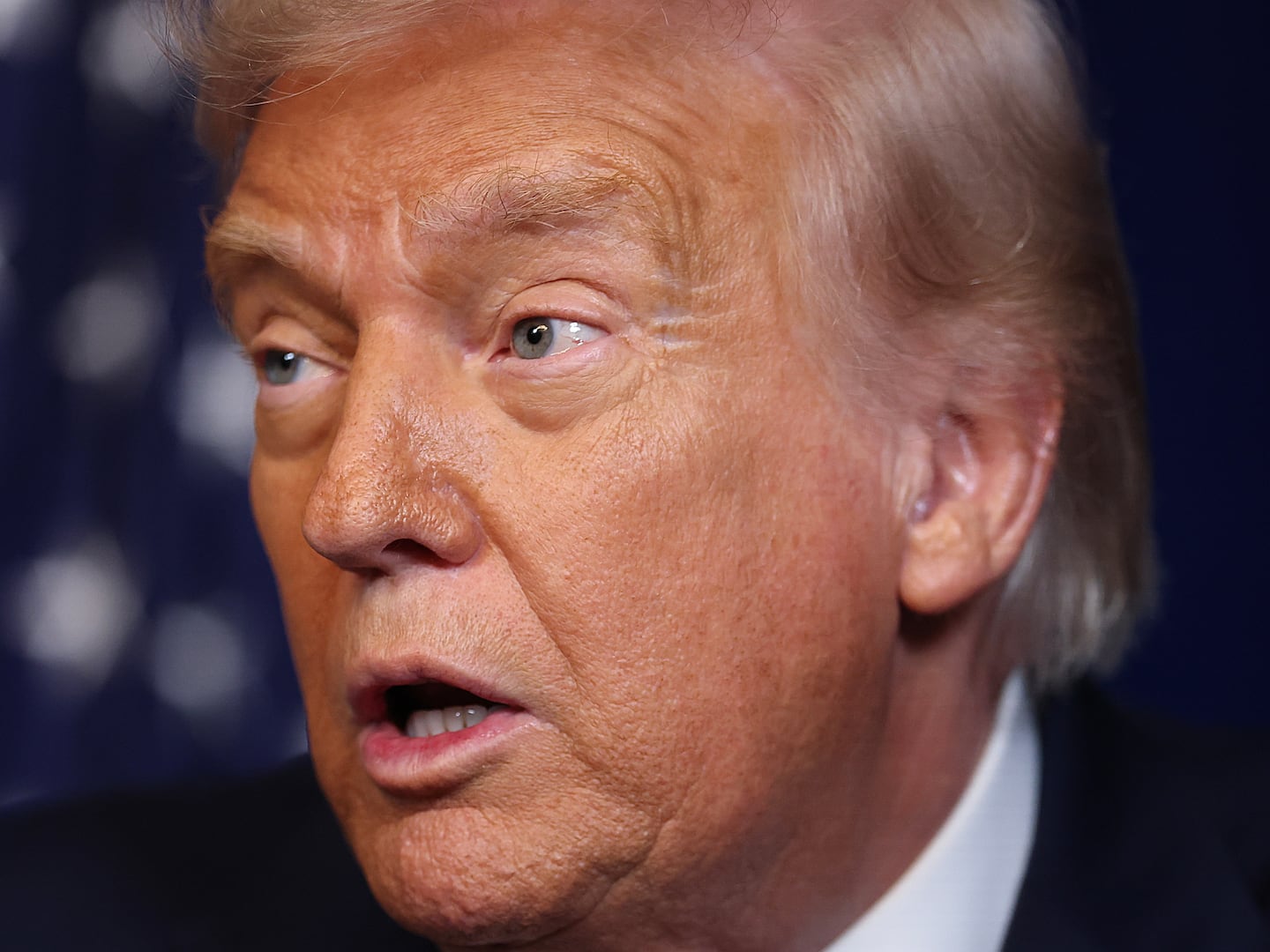ISTANBUL — The glamorous and sophisticated wife of the former emir of Qatar and mother of the current ruler is famous for glitzy globetrotting philanthropy. Hardly a week goes by without her being pictured rubbing shoulders with Western Royals and Hollywood superstars. But while promoting world peace and education for children born into poverty, Sheikha Mozah also provides patronage for Sunni clerics whose views wouldn’t be out of place in ISIS-controlled Mosul or Raqqa.
The inconsistency in the roles of Sheikha Mozah, the publicity-friendly face of the richest little emirate in the world, highlights the deep contradictions at the heart of Qatar, which occupies a spit of desert jutting into the Persian Gulf.
The emirate’s ruling family has been keen to leverage fabulous natural gas-based wealth into lasting regional and international influence, and to establish Qatar as a modern state and Western ally. It is home to the biggest American military installation in the Gulf. But Qatar’s adherence to Wahhabism, the strict Muslim school of thought associated mainly with Saudi Arabia but also the emirate’s official faith, ends up with the ruling family trying to pull off an increasingly precarious balancing act.
The Qataris are terrified that they will get gobbled up by Saudi Arabia the way Kuwait was devoured briefly by Iraq’s Saddam Hussein in 1990, says analyst David Weinberg with the Foundation for the Defense of Democracies, a Washington-based think tank. “Their manpower shortage means that they will never be a hard military power, so they seek to build soft power by turning their money into international influence. The problem is the totally amoral way in which Doha seeks to do so.”
That is clearly on display with the Qatar Foundation, an immensely wealthy charity Sheikha Mozah founded and oversees. Sheikha Mozah is the second wife of Qatar’s former emir, Hamad bin Khalifa Al-Thani, who stepped aside last year, handing off power to his son, Sheikh Tamim. She is lauded as a reforming force in the conservative-minded emirate and her supporters cite her dedication to the education of girls. Some more hidebound members of the 2,000-strong Qatari royal family are known to resent Sheikha Mozah’s clout—as much as they do the risqué flash of her trademark red high-heeled shoes.
But the pull backwards also is obvious—even with Sheikha Mozah. Her foundation is set to host a series of religious prayers and lectures as part of a month-long annual Ramadan program to be held at the charity’s new lavish mosque in Doha’s Education City. The flier for the Ramadan events promises well-respected religious scholars but among the invited there figures a preacher who has described the Charlie Hebdo massacre in Paris as “the sequel to the comedy film of 9/11” and another cleric who says, “Jews and their helpers must be destroyed.”
Critics say the presence of so-called “hate preachers” like Charlie-mocker Omar Abdelkafi and Aidh al-Qarni at the Qatar Foundation’s mosque, which was inaugurated in March with Sheikha Mozah in attendance, is not unusual. In fact the preacher chosen for the mosque’s inaugural prayer service three months ago was Saudi cleric Saleh al-Moghamsy, another unflinching advocate of stern Wahhabism. Al-Moghamsy argues that al Qaeda founder Osama bin Laden died with more honor in the eyes of Allah than any Jew, Christian, Zoroastrian, atheist, or Islamic apostate simply because he died a Muslim.
Sheikha Mozah was photographed praying at al-Moghamsy’s service. Other prominent locals were in attendance, including Qatar’s energy minister and the firebrand cleric Yusuf Qaradawi.
The Qataris have been coming under increasing pressure from the Obama administration and other Western governments to curb the emirate’s ties with radical Islamic movements. Administration officials say Qatar has replaced its neighbor Saudi Arabia as the biggest source of private donations to the so-called Islamic State and al Qaeda affiliates. Qatari officials take limited action when the spotlight is on the money flows from the Persian Gulf to the jihadis, but ignore them when the West is not clamoring for action. Again, the emirate is trying to have it both ways.
And another source of increasing Western frustration is how Qatar’s landmark mosques are used as platforms by hardline clerics. In February, The Daily Beast reported on how the Imam Muhammad Ibn Abdul Wahhab Masjid Doha, the biggest mosque in Qatar, hosts preachers notorious for helping to provide the ideological underpinning of the extremism that has spawned al Qaeda and the so-called Islamic State, or ISIS.
Announcing the Education City mosque, the Qatar Foundation said the new building reflected a “strong commitment to… plurality,” but in its few months of existence it has been building up a reputation to the contrary—if plurality means embracing different faiths.
The Qatar Foundation is seen in the emirate as a state-within-the-state—its budget is considerable although opaque and remains unpublished. One of the most ambitious stadiums Qatar is building for the controversial 2022 World Cup competition is in the QF’s Education City. Education projects funded by the QF have received international recognition and awards. Sheikha Mozah boasts honorary doctorates for her philanthropy from a slew of Western universities, including Washington, D.C.’s Georgetown University and London’s Imperial College.
Since 2003, she has been UNESCO’s Special Envoy for Basic and Higher Education.
In 2013, she was awarded the George H.W. Bush Award for Excellence in Public Service by the George Bush Presidential Library Foundation at a ceremony in Maine by the former U.S. president and Barbara Bush. One of the Qatar Foundation’s flagship initiatives, the “Educate a Child” program, aims to bring quality primary education to disadvantaged children throughout the world. “The seeds of prosperous minds begin with education,” Sheikha Mozah, a mother of seven, said in a speech accepting the prize. “Educate a Child is working to reach the world’s hardest-to-reach children … to break the vicious cycle of poverty.”
The 1,000-acre Education City hosts eight satellite campuses of Western universities, including Northwestern and Texas A&M. Students from the campuses are reported to have attended services at the new mosque and yet… since March there’s been this parade of infamous preachers.
It was the turn on May 1 of Salman al-Audah, a Saudi preacher who maintains Jews use “human blood” for Passover matzoh, “believing that this brings them close to their false god.”
“The choice that really takes the cake was the decision to host a Saudi cleric named Abdulaziz al-Fawzan on May 29,” says the FDD’s Weinberg, who has been monitoring the preacher rosters of landmark Qatari mosques.
Weinberg notes al-Fawzan preached at the Education City mosque just one week after ISIS mounted a suicide bombing in eastern Saudi Arabia targeting a Shia mosque that killed 21 people and injured more than 100 others. Abdulaziz al-Fawzan is virulently anti-Shia and a few weeks before his sermon in Doha he declared on social media: “The history of the rafidha [derogatory term for Shia] is full of criminality and betrayal/treachery: wars and destruction, killing and assassinations, and conspiring with the enemies of the ummah, even to the point of poisoning and sorcery against those who oppose them, may Allah fight them, how deluded they are!”
On the day of his sermon in Education City another ISIS suicide bomber struck a Shia mosque in Saudi Arabia. The toll was four dead. Abdulaziz al-Fawzan has also urged Muslims to “hate” Christians and explained the 2004 Southeast Asia tsunami as divine retribution for resorts where “fornication and sexual perversion of all kinds are rampant.”
U.S. Ambassador Alberto Fernandez, who recently retired as coordinator of the State Department’s Center for Strategic Counterterrorism Communications, has described al-Fawzan as “one of the worst.”






